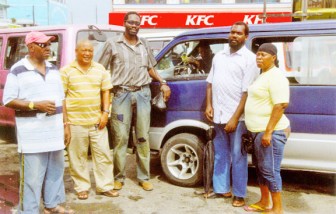Labour activist Ian Andrews is seeking official recognition and endorsement for what he says is the first trade union for the private transport sector in the Commonwealth
Ian Andrews concedes that the efforts of the United Mini Bus Workers Union (UMBWU) to unionise the owners, drivers and conductors of the country’s privately operated minibuses is as close to “an industrial relations miracle” as one can get.
He stops just short of suggesting that his quest can be likened to trying to tame a high-spirited racehorse, but the implications of his suggestion are clear. Still, he insists that the feedback the union has received on “the road” suggests that the men and women with minibus “connections” are not averse to some form of representation.
The need for such representation arises in large measure from what they perceive to be the perils of the trade, which, they say, include encounters with the police over traffic transgressions and disagreement with government over whose right it is to set bus fares.

Andrews says there is something discomfiting about what is, in effect, “a national road transportation service” over which there are no controls or regulations. “The service may have multiple private owners but it performs a critical countrywide function. We are not talking about uncomfortable state regulations. What we are looking for are rules and procedures that help to give some shape to a service that thousands of people depend upon.”
Andrews estimates that there are “upwards of 30,000 minibuses” plying the various routes across the country. He says that, all told, minibuses probably employ in excess of 50,000 people; owners, drivers, conductors and touts. The union does not recognise touts, though Andrews says it is “not inconceivable that we might be able to create a legitimate role for those persons whom we now call touts. The problem is that we have to be mindful that we create as comfortable an environment as possible for commuters and touts do not always create that kind of image. Sometimes the kinds of touting that we see can create image problems.”
Andrews’s union lays claim to membership of owners, drivers and conductors from 13 local minibus routes including those covering the coastal regions of Guyana. The actual jurisdiction of the union, however, is unclear. Some minibus operators in Region Three and Region Four say they do not recognise the union.
Andrews does not deny that the unionisation of the “interested parties” in the country’s road transportation sector is “a work in progress.” His own challenges begin with “recognition,” by the Police Traffic Depart-ment and the Ministry of Works. Andrews says he has been encouraged by his engagements with Home Affairs Minister Clement Rohee. The minister, he says, supports initiatives that seek to bring a sense of order to the chaos that sometimes attends the industry. In Andrews’s view the unionisation of the minibus industry can help bring the situation under control. Still, he believes that some form of official “recognition” to facilitate some measure of collaboration between the union and the Guyana Police Force might help fix the problem.
Andrews believes his background in the trade union movement equips him to lead such a union. “We are the only union in the Commonwealth that has attempted to create a bargaining unit out of a transportation service that has several private owners,” Andrews says.
His foray into the labour movement began as an employee at Banks DIH Ltd where he held an executive position with the General Workers Union (GWU). Subsequently, he served as a union official inside its secretariat and eventually moved to the Guyana Trades Union Congress.
Andrews believes the strengthening of the union represents a “win-win” situation for all of the various interest groups involved in the minibus industry. He says that for all its weaknesses the minibus industry is “a legitimate part of the private sector.” The union’s concern, he says, is with ensuring that the industry secures its rights and discharges its obligations, “whatever those may be.” At the moment and despite the importance of the service they provide, he says, “I still see minibuses operating somewhat on the fringe.”
He points to the many unruly elements within the industry and that the industry as a whole is still vulnerable to abuse. He believes that bringing an end to that abuse involves the creation on an institution that can provide “effective representation” for the service providers in the industry.
On the streets, he says, there is both recklessness and vulnerability. He concedes that on the one hand there are “loose cannons”; people who act irresponsibly. “The problem is that contrary to what many people think, that is not, universally, the case. There are owners, and drivers and conductors who are good, honest people who are simply working to support their families. The problem is that, to a large extent, the industry has been stigmatised by the actions of a minority. That stigmatisation sometimes leads to the industry being perceived by the authorities in a particular way.”
Andrews says that while the task often seems daunting he views the unionisation of the sector as a challenge. He believes success can create one of the largest and most influential trade unions in Guyana. “Actually, a union in this instance is about more than the owners and the workers in the industry. It’s about creating relationships with the authorities and about making life more comfortable for commuters.”





